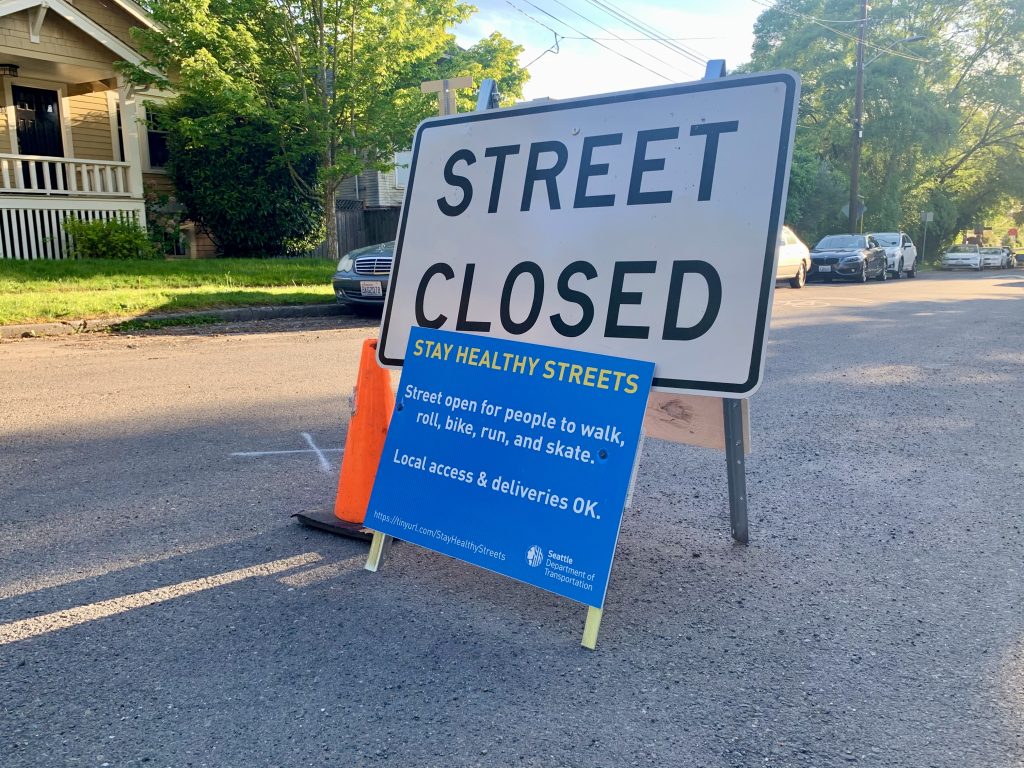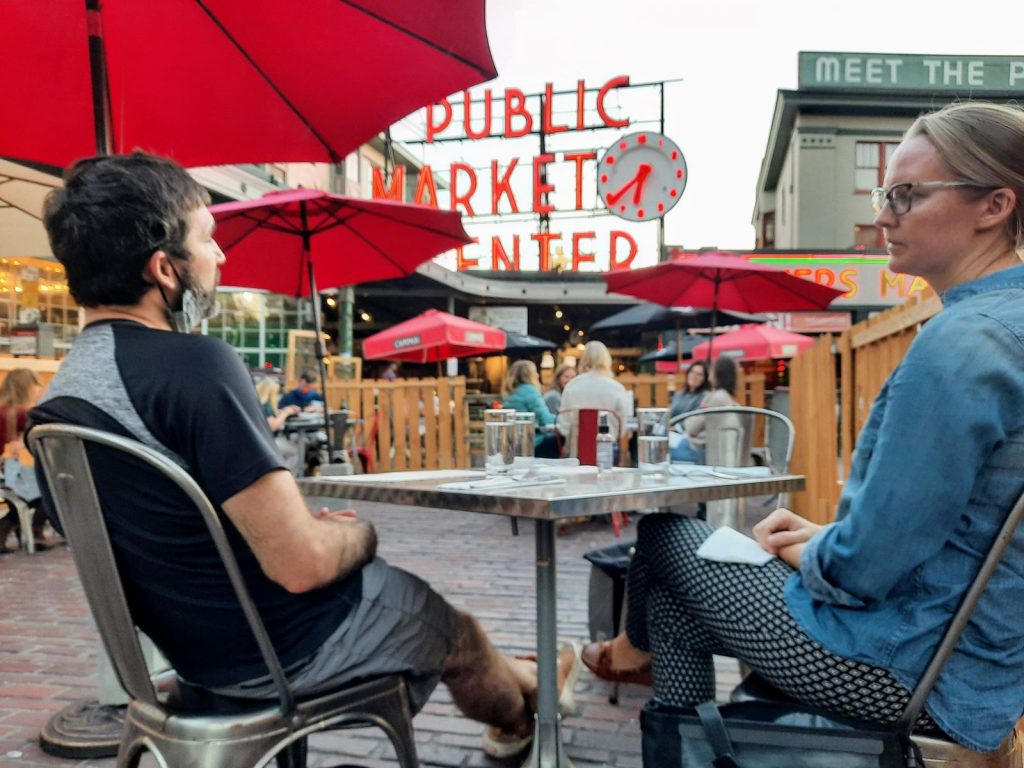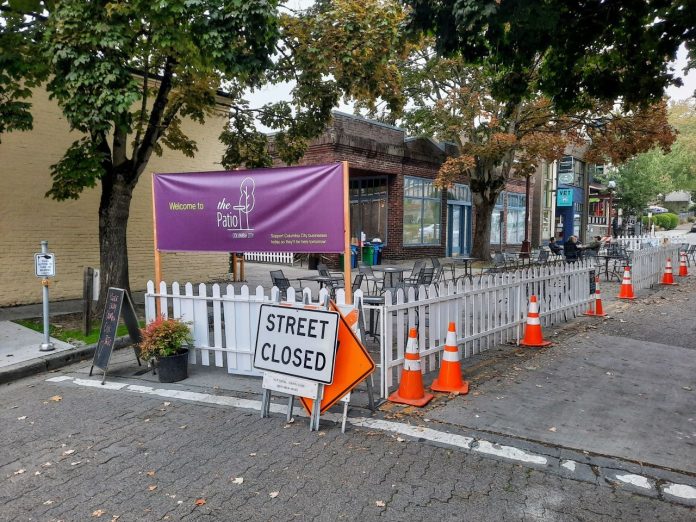After a long delay to start the program, the City of Seattle announced an even longer extension for restaurants and businesses to continue using public spaces for outdoor dining and retail. Seattle Department of Transportation’s (SDOT’s) temporary street use permits will be extended through October 31, 2021.
The program to allow small businesses to expand operations outside is designed to ease the impact of pandemic restrictions. The city started offering free permits for restaurants and businesses in late summer after several months of dithering. Now these permits will remain in effect for an entire year.
Outdoor spaces have more flexibility than indoor spaces. Dining by members of different households at the same table is permitted outside. Using the outdoor space is a relief valve for indoor areas that simply cannot approach their capacity with social distancing.
While other jurisdictions got their programs up and running before Seattle, the city’s adoption has been widespread. Businesses can receive one of two types of permits. Either they can extend seating and merchandise into parking spaces and sidewalks in front of the restaurant, or they can work with neighbors to completely open the street for exclusively pedestrian and outdoor uses. As of the extension announcement, 151 permits were issued for some street use and 11 blocks have been fully opened.
Of most importance during the coming fall and winter months, the extension includes two initiatives from the Seattle Fire Department: free tent permits and free outdoor heating permits. There is no waiver of the fire code and tent permits continue to last 90 days with regular SFD inspections. But the shelter from winter weather is hoped to extend the utility of the outdoor seating. Businesses that paid for tent or heating permits prior to this announcement will receive refunds.
The permitting process for a full street closure does have limiting hurdles. Applicants are required to have support from neighboring businesses and residents prior to issuance of a street closure permit. Businesses are responsible for all outdoor equipment including barriers, as well as getting permission to serve liquor outdoors.
The press release was accompanied with the standard pulled quotes from Mayor Jenny Durkan, such as, “The COVID-19 crisis and resulting economic devastation has caused so many of our small businesses to face the potential of closing their doors forever… At the City, we’re committed to helping our small businesses safely and feasibly reopen and sustain operations even as it gets rainy and cold.” SDOT Director Sam Zimbabwe offered: “Since the beginning of the COVID-19 crisis, we’ve reimagined how to use the public right-of-way to create opportunities and tools to support our City’s small businesses.”
The announcement of this objectively good program is tempered by the growing perception that the Mayor’s office does not have a larger perspective of the issues. That was kind of understandable early in the pandemic, but it is a saw that is wearing thin.
The Mayor’s press release concluded, “The City continues to develop creative new policies to help small business owners operate outside in a way that’s comfortable, safe, and healthy for their customers. The City will have more information on new initiatives in the coming weeks.” Now that we are eight months into this pandemic and looking forward to at least a year more, the promise and wait for creative new initiatives is getting repetitive.
Perhaps the way to start getting creative is to get some of the basics correct. None of the Stay Healthy Streets that are open for walking and cycling actually connect to the open Cafe Streets. This is due to the Stay Healthy Streets running primarily through lower density neighborhoods and restaurants being confined along arterials. Extending Stay Healthy Streets to the open streets would be a very basic and straightforward connection to make. The 130 miles of open streets Seattle Neighborhoods Greenways proposed (and which The Urbanist endorsed) would help address this.

The city can also be proactive. Given the number of food trucks that are not getting lunchtime business in South Lake Union, the city could identify and expedite permitting for places along Stay Healthy Streets for these small businesses to operate and safely distance. Encourage a mid-year Park(ing) Day, that takes over parking spaces with well designed and safe parklets more than just mid-September. Don’t just tell us that there are 151 restaurants that are operating outside, build on Eater Seattle’s list and produce a map. Do the kind of marketing stuff that the city usually does, with an eye towards safety of employees and residents.
And, of course, completely and finally pedestrianize Pike Place Market.

Not all of this is in the Mayor’s court. District 6 Councilmember Dan Strauss, early proponent of open streets, supports going beyond October 2021. “Café Streets should be a permanent feature in Seattle. Today’s extension is another step in that direction–to test what works and what doesn’t work for businesses, neighborhoods, and people over the next year.” The City Council has its own authority through the budget and zoning to correct some of these gaps and can take a lot of steps to make these novelties into a cornerstone of our recovery.
Here is the balance to be struck. King County’s Covid activity numbers are low, but not flat. People are reasonably concerned about more reopening. There is a perception that any activity bringing people together will necessarily bring a lot of people together. Opening restaurants and shops can feel frivolous while being a mega-attraction. Outbreaks like UW’s Greek Row does not help that perception.
However, steps that make open streets, cafe streets, and safe streets part of the permanent context of our city are also steps that show these are not extravagant. It’s wholly reasonable to be able to enjoy a meal outside and we could have been doing it well before a pandemic. We deserve a nice, walkable city with good places to eat and shop. If we have more of them, outside, all the sudden they aren’t crowded. Making open streets basic, boring, and permanent may be the most creative new policy.
Ray Dubicki is a stay-at-home dad and parent-on-call for taking care of general school and neighborhood tasks around Ballard. This lets him see how urbanism works (or doesn’t) during the hours most people are locked in their office. He is an attorney and urbanist by training, with soup-to-nuts planning experience from code enforcement to university development to writing zoning ordinances. He enjoys using PowerPoint, but only because it’s no longer a weekly obligation.


